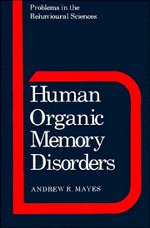Book contents
- Frontmatter
- Contents
- Acknowledgements
- 1 Healthy and pathological memory: the underlying mechanisms
- 2 The assessment of memory disorders
- 3 Disorders of short-term memory
- 4 Disorders of previously well-established memory
- 5 The memory problems caused by frontal lobe lesions
- 6 Organic amnesia
- 7 Animal and biochemical models of amnesia
- 8 Less well-characterized memory disorders
- 9 Overview
- Glossary
- Bibliography
- Index
- Frontmatter
- Contents
- Acknowledgements
- 1 Healthy and pathological memory: the underlying mechanisms
- 2 The assessment of memory disorders
- 3 Disorders of short-term memory
- 4 Disorders of previously well-established memory
- 5 The memory problems caused by frontal lobe lesions
- 6 Organic amnesia
- 7 Animal and biochemical models of amnesia
- 8 Less well-characterized memory disorders
- 9 Overview
- Glossary
- Bibliography
- Index
Summary
In this book, five possible groups of elementary organic memory disorders have been discussed. It is still controversial whether the disorders considered are truly elementary or whether at least some of them are composed of two or more independent disorders that could be separately compromised by more selective lesions. For example, the organic amnesia caused by medial temporal lobe lesions may differ from that caused by diencephalic lesions, and lesions of the hippo-campal and amygdalar circuits may disrupt recognition for somewhat different reasons. This kind of issue is hard to resolve, partly because lesions in humans are adventitious and tend not to honour boundaries between functionally distinct brain regions, so that it is often difficult to distinguish between cognitive deficits that are essential to a memory deficit and those that are incidental to it.
Despite the problems, five groups of organic memory deficits can be identified. The first group of memory deficits is caused by lesions to PTO association neocortex. This neocortical region includes parts of the parietal, temporal, and occipital lobes and is not specialized for obvious motor or sensory functions. Instead, as its neurons lie several relays away from the sensory input, it is probably concerned with the later stages of analysis and interpretation of sensory information. Lesions to it can cause breakdowns that comprise several kinds of fairly selective short-term memory deficits specific to certain types of information. These disorders, which are discussed in chapter 3, probably arise for a number of reasons, although it still needs to be shown convincingly that they are ever caused by isolated disruption of short-term storage, rather than of specific encoding and retrieval processes.
- Type
- Chapter
- Information
- Human Organic Memory Disorders , pp. 261 - 270Publisher: Cambridge University PressPrint publication year: 1988

